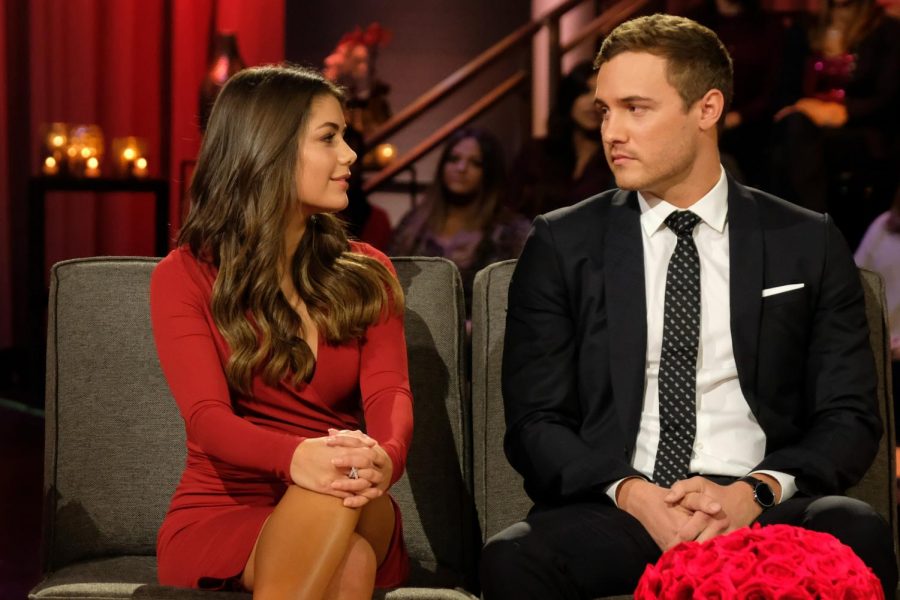‘The Bachelor’ portrays an unhealthy example of love
“Bachelor” contestant Hannah Ann Sluss (left) and bachelor Peter Weber (right).
May 29, 2020
“The Bachelor,” “The Bachelorette,” “Bachelor in Paradise” and other “Bachelor” spin-offs are widely watched shows throughout Madison and the United States, but is competing for love really an example we want to follow?
“The Bachelor” focuses on one man, the bachelor, and 30 contestants who are all fighting for the same goal: to end up engaged to the bachelor. Each week, the bachelor gives roses to the contestants he sees himself being most compatible with, and those who do not receive a rose are sent home. The elimination process continues until there are two contestants left by the final episode. In the finale, each contestant meets with the bachelor, and he either proposes or sends her home.
The most recent season of “The Bachelor” followed Peter Weber. He was one of the final three contestants in Hannah Brown’s season of “The Bachelorette.” Weber ended his season engaged to Hannah Ann Sluss but broke off the engagement because his feelings were with Madison Prewett. Prewett had left the show because she felt that she and Weber were not realistically compatible. Sluss said during their engagement she was “miserable” because she knew Weber’s feelings were still with Prewett and Brown. Weber’s relationships that have come from the “The Bachelor” have continuously failed because it is more important to the viewers and producers for Weber to get engaged than to truly find love. He was unable to fully commit to one woman.
In Brown’s season of “The Bachelorette,” her final two contestants were Jed Wyatt and Tyler Cameron. She chose to accept Wyatt’s proposal but later found out he had lied about his previous relationship. Wyatt had told Brown he had a girlfriend before the show had started but did not include how serious their relationship had been. He was not honest with Brown that he had originally planned to marry the other woman. Brown broke off her engagement with Wyatt. After the end of her engagement, Brown asked Cameron if he would like to “hang out sometime.” Many fans were angry at her decision to reject Cameron’s proposal then return to him after her engagement with Wyatt did not work out.
Both Brown and Weber ended up breaking their engagements off. This leads viewers to ask: how healthy are the relationships produced from the “Bachelor” franchise?
Is the idea of competing for love something we want to accept? In a healthy relationship, it should not feel as if there is a constant threat of your significant other leaving you for another person. The competition creates a toxic environment, where contestants are constantly tearing each other down.
In the most recent season of “Bachelor in Paradise,” Demi Burnett and Derek Peth were a couple. Burnett was open about her previous relationship with Kristian Haggerty, a woman outside the “Bachelor” franchise. The producers then brought Haggerty onto the show, which led to Peth and Burnett’s breakup. Haggerty and Burnett rebuilt their relationship and Peth decided to leave the show because he did not see himself as being compatible with any other contestant. Burnett’s relationship with Peth was not stable because her feelings were with another person. A relationship built on dishonesty and disloyalty is going to fail.
The premise of each “Bachelor” spin-off is to fight for love. The producers’ constant intervention shows the desire for drama instead of actual love stories. The fight for love doesn’t show a strong base for a relationship. Whichever contestant ends up “winning” the engagement knows that the other finalists had a chance at a relationship with their significant other. The couple is starting a monogamous relationship with an engagement. The whole base of their relationship began with the winner fighting with other contestants and the bachelor or bachelorette dating multiple people. A relationship should be strongly based on honesty and trust, but that isn’t able to be established while the bachelor or bachelorette is dating multiple people at once.
The toxicity of the “Bachelor” franchise is not an example viewers want to follow, however entertaining it might be. This doesn’t mean viewers can’t enjoy the shows and the drama included in them, but they shouldn’t let the media affect their perception of a healthy relationship.



